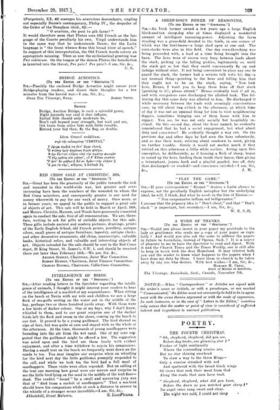INTELLIGENCE OF BIRDS.
(To no Eorroa or Tan " Eirscrares."I SIR—After reading letters in the Spectator regarding the intelli- gence of animals, I thought it might interest your readers to hear of the intelligence of a sea-bird of my acquaintance. When sitting on the beach at Resin with my wife and children we saw a large flock of sea-gulls resting on the water out in the middle of the bay, perhaps two or three hundred yards away. With them were a few birds of darker colour. One of my boys, why I don't know, whistled to them, and to our great surprise one of the darker birds left the flock and swam to the shore, coming up the beach to our feet. It proved to be a young guillemot. The bird showed no sign of fear, but was quite at ease and stayed wills us the whole of the afternoon. At the time, thousands of young sandboppers were bounding into the air from the wet sand. One of my sons sug- gested that the guillemot might be offered a few. The suggestion was acted upon and the bird ate them freely with evident enjoyment, and after a time withdrew to rejoin his companions. Having a small tent on the beach we frequently went down on the sands to tea. You may imagine our surprise when on whistling for the bird next day the little guillemot promptly responded to the call, and while we took tea the bird had a full meal of sandhoppers. These visits were often repeated. But on calling at the tent one morning bow great were our sorrow and surprise to Bee the little bird lying on the sand in the middle of the tent floor— dead. The verdict " found " by a small and sorrowing jury was that of "died from a surfeit of sandhoppers." That a sea-bird should leave his companions while at such a distance in answer to the whistle of a stranger seems inereilible.—I am, Sir, fic-


























 Previous page
Previous page